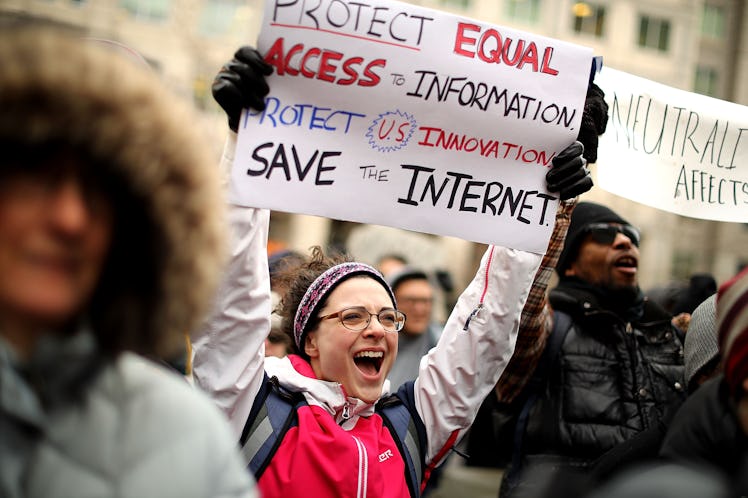
The Senate Pushed A Vote On Net Neutrality To Save Your Easy Netflix Streaming
In a last-ditch effort to win over young voters, Senate Democrats won a vote on Wednesday, May 17, to halt the repeal of Obama-era internet regulations commonly known as "net neutrality." But is net neutrality saved? The Senate pushed a vote this week and it could impact your internet. The move is more a Democratic flex-of-muscles than it is a meaningful change on the issue, because the resolution likely won't fly in the House.
In December 2017, the Federal Communications Commission (FCC), under new leadership from Trump-appointed chairman Ajit Pai, voted to essentially repeal the rules that the commission itself passed two years earlier. In essence, "net neutrality" regulations restrict internet service providers' (ISPs) power to slow down or speed up access to specific websites and apps. Without the rules in place, ISPs could create different payment plans or processes for consuming or prioritizing certain types of content. As The New York Times reported, some Republicans would like to introduce their own "net neutrality" rules to replace the Obama-era ones, instead of repealing them and not replacing them. That's part of what makes the future so uncertain.
What is known, however, is that the FCC is likely to move ahead with the repeal and continue on with its agenda in other areas.
"The @FCC's June meeting will be a summer blockbuster," Pai tweeted on Wednesday, May 16. "We'll be considering everything from 5G spectrum to new satellite broadband options to ways to encourage the transition from fading copper lines to next-gen fiber."
The final vote on Wednesday was 52-47, reported NPR, with three Republican senators voting in line with the Democrats on the issue — Sen. Susan Collins of Maine, Sen. John Kennedy of Louisiana, and Sen. Lisa Murkowski of Alaska. On the Democratic side, you had lawmakers touting the victory as a show of force ahead of the midterm elections in the fall, whereas Republicans labeled the vote as something of a nothingburger.
“Contact your Republican senator,” Sen. Chuck Schumer, the Senate minority leader, said before the vote, per The New York Times. “See who votes for net neutrality and who votes against. And let them know how you feel about the way they voted.”
The Times characterized the "net neutrality" issue as one of three tentpoles for the Democrats' campaign to energize young voters during the midterms and take back the Republican-controlled House and Senate. The other two key issues were gun control and marijuana legalization. Sen. Edward Markey, of Massachusetts, said on Wednesday that these "net neutrality" provisions affect an intersection of generations, personalities, and careers, per NPR.
"The grandparents, the gamers, the gearheads, the geeks, the GIF-makers, the Generations X, Y, and Z. This movement to save net neutrality is made up of every walk of American life," he said.
Lots of celebrities and internet personalities have been tweeting and posting about the "net neutrality" rules, in an effort to protect the way the internet currently functions — allowing equal prioritization of content for all.
At the 2018 Webby Awards on Monday, May 14, Stranger Things star David Harbour won a special achievement award, and the award ceremony traditionally asks recipients to give a “five-word speech” for timing purposes. Harbour used his speech to address this essential internet issue when he shouted into the microphone, “Net neutrality, you greedy d*ckheads.” With "net neutrality" gone, ISPs could charge Netflix more money for more bandwidth, and those costs could potentially be transferred to users — similar to the model in countries like Portugal, where "net neutrality" provisions don't exist.
Silicon Valley start-ups have reportedly voiced support of the stricter rules and have backed Democrats on the issue, per The New York Times. Dozens of companies, including Pinterest, Medium, Redfin, and Etsy, wrote to lawmakers in December 2017 in support of the vote to restore the rules.
“The repeal of open internet protections threatens the very foundation of the internet,” the letter reads, per The Times. “The F.C.C. has abandoned its long history of net neutrality protections and left consumers and businesses without essential protections for their lives and work online.”
The FCC's next meeting is set for June 7, and will — somewhat ironically — be available to livestream.